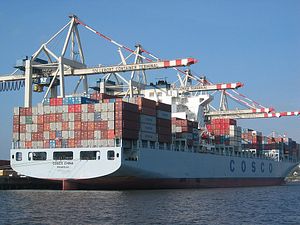COVID-19 is jeopardizing economies, especially as the central economies in international trade, such as the United States, China, Germany, are hard-hit, leading to supply chain contagion and trade collapse like 10 years ago. The International Monetary Fund projects the world output is down 4.9 percent in 2020, with a decline of 8 percent in advanced economies and 3 percent in emerging markets.
In 2018, China accounted for 11.37 percent of global imports and 13.45 percent of global exports, becoming the top trader in the world. Now China is the first country to contain COVID-19 and revive the economy in 2020. Meanwhile, President Xi Jinping is calling for China to form a new pattern of development gradually, in which the domestic production-consumption cycle plays a dominant role and both domestic and international cycles reinforce each other in July 2020. Given the positive relationship between international trade and economic development, the question of how to unleash the vitality of Chinese foreign trade matters a lot for the revival of the global economy. The pandemic has severely hit developed countries, causing a steep reduction in their prominence in trade networks, but this has not affected the central position of China.
Currently, the world is seeing a drastic reduction in trade interconnection, connectivity, and density among countries. In response an internationally coordinated economic stimulus program and efforts to reduce tariffs and non-tariff trade barriers are necessary. Since early April, stimulus packages issued in many countries have had a positive impact on the level of economic activities. For example, the package in China covered fiscal policies, monetary policies, social insurance policies, and international trade facilitations, while the European Union’s 1.8 trillion euro budget for the multiannual financial framework and Next Generation EU provides full support for rebuilding and digital transitions.
In essence, the pandemic won’t reshape international relations, but it will accelerate history. Besides the impact of COVID-19, we should fully realize the pressure from the structural competition between China and the U.S. and the bump of deglobalization, and respond accordingly. In the post-pandemic era, promoting international trade will not only be based on capital, labor, and technology endowments, but will need to take political, cultural, and social issues more into account. In the past 20 years, Chinese firms have been internationalizing at an unprecedented speed yet with mostly negative media coverage in Western countries. The negative impression of Chinese firms will hinder foreign trade in the long-term. It is the right time to make changes now.
As for the Chinese government, first, China should play a constructive role in multilateralism under the World Trade Organization structure and work together with the EU to reach a plurilateral agreement on trade disputes settlement. Second, China should insist on promoting the construction of the regional trading system, such as the China-Japan-South Korea Free Trade Zone. The long-dreamed-of trilateral zone has made a breakthrough in 2020 and can be developed as an economic stimulus for the regional and global economy after the shock of the pandemic. Third, China should prioritize law-based rules for the business environment in China and Chinese overseas corporations, which can be essential to decrease the uncertainty of trading system under changeable world politics.
For multinational corporations from China and those involved in international trade, the recruitment of senior management personnel who are experienced in laws, politics, culture, and history is much more necessary than before. Understanding the people and the society is a necessary step to develop long-term trading prospects. Second, reforming the entrepreneurial culture from the outside in and improving the weight of cultural exchanges is a must. Third, employing local talents to the full extent and using their advantages for transnational business and communication will help unleash foreign trade with China. These measures might have been taken by a small quantity of companies, but now it is time to reform the majority of companies, even those with relatively small scales.
To sum up, the change of international politics and business climate is an unstoppable trend. As a major country in the global trade network, China’s government and corporations must adjust actively for the coming of the post-pandemic age to make new breakthroughs on economy and make contributions to revive the global economy.
Xiaomeng Kang is a research assistant at Intellisia Institute and Dingding Chen is the president of Intellisia Institute in Guangzhou, China.

































